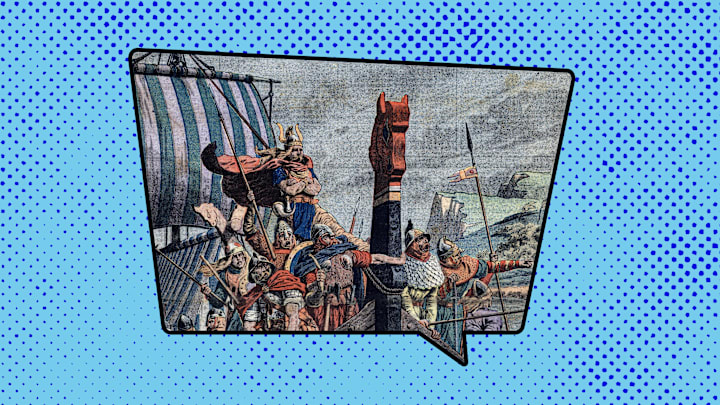For as long as we’ve had language, we’ve turned words against one another. From the insults and invective the Romans used to throw at one another in their speeches and addresses to the word-slinging matches of modern political debates and discourse, offensive and abusive words and phrases have a long and colorful history. And nowhere was that more the case than in Viking-era Scandinavia.
The Vikings spoke an ancient Northern Germanic language—making it a none-too-distant relative of English—known as Old Norse. It emerged in Scandinavia around 1000 years ago, roughly coinciding with the start of the Viking Age, before spreading out across much of Norse-controlled Europe in the centuries that followed. Eventually, it reached parts of Greenland, the Faroe Islands, Great Britain, Ireland, and even coastal France. Norse was a complex and varied language, with several distinct dialects and a rich literary history evidenced by several major works of prose and poetry. And it is in that written record that historical linguists and scholars of Norse literature have uncovered a surprisingly robust vocabulary of Viking-era insults—some of the best of which are listed here.
1. Amlóði
Amlóði was in simple terms a Norse word for a fool—or, more specifically, someone who is too weak or foolish to do their work or what’s asked of them. The word was also the origin of a Norse first name, Amleth, which (according to one etymological theory, at least) later developed into the name Hamlet. It has even been suggested that Shakespeare might have been inspired by a Scandinavian folktale about a prince named Amleth who pretended to be mad while he sought revenge on his murderous uncle.
2. Argr
As an adjective, argr meant “weak” or “effeminate” in Old Norse, but by extension, the word also came to be used as a noun for a cowardly wretch.
3. Eldhús-fífl

Literally meaning “fire-house” or “fire-hall,” eldhús was a kitchen, a banqueting hall, or any similarly large room or building that featured a fireplace. That makes an eldhús-fífl literally a “fireside fool”—in other words, an empty-headed person who does nothing but sit beside the fire all day.
4. Frunti
Perhaps related to the Scots word frunty, meaning “bold,” to the Vikings a frunti was a rude and boorishly forward person.
5. Geit

In Old Norse, geit referred to a she-goat—but as an insult, the same word could also be used for a cowardly, gutless person.
6. Grybba
An insult directed at women meaning “ugly hag.”
7., 8., and 9. Hórbarn, Hórkarl, and Hórkerling
The Viking word hór is likely related to its English soundalike, which made a hórbarn a child who was conceived adulterously. A hórkarl, meanwhile, was an adulterous man, and a hórkerling was “a strumpet” according to one definition.
10. Hrímaldi
Hrím was a Norse word for both hoar frost and the soot that accumulates on a kettle. Hrímaldi, therefore, was a lazy idler—literally, someone who would rather lounge by the fire than get on with their work.
11. Hrísungr
Derived from a Norse word for scrubland or vegetation, hrísungr was seemingly used both as a legal term for an illegitimate child and as a general term of abuse for someone of doubtful parentage.
12. Hrotti

Hrotti was an Old Norse word for a sword, but the Vikings commandeered the term as an insult, using it in a metaphorical sense to refer to an unpleasantly coarse man. The word still survives in Icelandic today as a word for a brute.
13. Mátviss
Describing someone using mátviss implied that they were a greedy, avaricious kind of person—the word literally means “meat-scenting.”
14. Níðingr
Níðingr (which is distantly related to the English archaism nithing, “a mean or wretched person”) was a term the Vikings used to refer to a villainous scoundrel. Etymologically, it’s related to an earlier word, níð, meaning “defamation” or “calumny.”
15. Sauðbítr

A general term of opprobrium that literally means “sheep-biter”—as in, a dog that worries sheep.
16. Skröggsligr
Distantly related to the English adjective scraggy, the Norse word skröggr was used as a nickname for a fox. That made the adjective skröggsligr—essentially, “scrag-like”—a useful term to describe anything or anyone that appeared “scraggy, gaunt, and ugly.”
17. Slyðra
The Norse word slyðra was used to describe a wet, sloppy lump or clump of something—or as an insult for someone who is unpleasantly shabby-looking.
18. Snápr
Distantly related to the modern word snob, snápr was a term used by the Vikings to refer to either a dolt or a charlatan—or, in looser terms, an unwise or untrustworthy man.
19. Trolshamber
The decidedly unpleasant word trolshamber was a specifically female insult in Old Norse. In literal terms, it means “someone in the guise of a hobgoblin.”
20. Tuddi

The word tuddi, literally meaning “a bull,” was also used by the early Norse Icelanders to refer to a mean, stingy person.
21. Vargdropi
Although used as a general term of abuse in Old Norse, vargdropi referred specifically to a child conceived during a period of its father’s outlawry (the word literally translates to “wolf droppings”). The child of an outlaw was also known as a rishofþe, or “scrubling”—apparently in reference to a child conceived in the wilderness on a bed of scrub and vegetation.
Discover More Insults Here:
